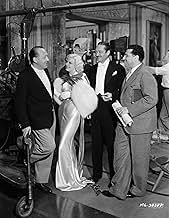La ricca Millicent e Oliver Jordan organizzano una cena per una manciata di conoscenti benestanti, ognuno dei quali ha molto da rivelare.La ricca Millicent e Oliver Jordan organizzano una cena per una manciata di conoscenti benestanti, ognuno dei quali ha molto da rivelare.La ricca Millicent e Oliver Jordan organizzano una cena per una manciata di conoscenti benestanti, ognuno dei quali ha molto da rivelare.
- Premi
- 1 vittoria
Trama
Lo sapevi?
- QuizAs originally filmed, Carlotta's dog was named Mussolini. However, due to the changing world political climate of the 1930's, the dog's name was post-dubbed as "Tarzan", even though Marie Dressler's lips are clearly saying "Mussolini".
- BlooperIn the opening scene, Millicent tells Oliver, "I see your precious Carlotta Vance arrived yesterday on the Europa." Later that same day, during Carlotta's visit to Oliver's office, she says, "I've been in New York four days and I'm lost."
- Citazioni
Kitty: [Final lines] I was reading a book the other day.
Carlotta: [Nearly trips] Reading a book?
Kitty: Yes. It's all about civilization or something. A nutty kind of a book. Do you know that the guy says that machinery is going to take the place of every profession?
Carlotta: [Looking her over] Oh, my dear, that's something you need never worry about.
- Versioni alternativeAlso available in a computer colorized version.
- ConnessioniEdited into Hollywood: The Dream Factory (1972)
- Colonne sonoreI Loved You Then As I Love You Now
(1927) (uncredited)
(From Le nostre sorelle di danza (1928))
Music by William Axt and David Mendoza
Played during the opening credits
Dressler heads a large ensemble cast, with several distinct but interlocking stories, all leading up to (but never quite making) a posh dinner party at the mansion of Billie Burke, wife of shipping magnate Lionel Barrymore. Desperately trying to snag (the unseen) Lord and Lady Ferncliffe moldering aristocrats she once met at Cap d'Antibes Burke bullies and badgers everybody she can think of to seat a swank table. Worrying about nothing so much as how 'dressy' the aspic will be it's the British Lion molded out of a quivering gelatin she's oblivious to the human dramas whirling around the people on her guest list.
For starters, her husband is not only seriously ill but close to bankruptcy, to boot. Down in his nautical offices on The Battery, he's paid a visit by an old (and older than he) flame, Dressler; a bit down on her luck herself ('I'm flatter than a pancake I haven't a sou'), she wants to sell her stock in his company. Another visitor, one of the sharks circling around to feast on his bleeding empire. is Wallace Beery, a loud-mouthed boor whom Barrymore nonetheless cajoles Burke into inviting, against her snobbish sensibilities. Beery, a politically connected wheeler-dealer, has problems of his own, namely his wife Jean Harlow. She lounges luxuriously in bed most of the day, changing in and out of fur-trimmed bed jackets and sampling chocolates while waiting for her doctor-lover (Edmund Lowe) to pay another house call under the pretext of tending to her imaginary ailments.
Burke's and Barrymore's young daughter, meanwhile, conceals a clandestine affair with 'free, white and 45" marquee idol John Barrymore, a washed-up drunk whose grandiose airs can't even fool the bellboys he sends out for bottles of hooch (a storyline in the screenplay, co-written by the also alcoholic Herman J. Mankiewicz from the George S. Kaufmann/Edna Ferber stage hit that can't have been comfortable for the similarly afflicted Barrymore, who's even referred to in the movie by his emblematic sobriquet 'The Great Profile').
Those are the major strands of the story, but there's even more talent on board: Louise Closser Hale as Burke's pithy cousin; May Robson as the cook in charge of the ill-starred aspic; Lee Tracy, as John Barrymore's exasperated agent; and, deliciously, Hilda Vaughn as Harlow's mercenary maid.
The goings-on range from the farcical to the tragic, and for the most part, the cast does proud in coping with the often drastic shifts of tone (true, some episodes carry more weight than others, some players less inspired than their colleagues; it's an episodic movie, at times dated, from the infancy of talkies when scenes were not a snappily edited few seconds but prolonged and often stagy).
Still, in this starry cast, Dressler shines brightest. A Canadian gal who started in the circus, she worked in vaudeville, theater, and, in the last few decades of her life, in Hollywood. Despite her girth and the delapidations gravity had worked on her face, she's never less than transfixing. She tosses off the requisite comedy as effortlessly as that oldest of pros that she had become, yet can draw the camera to her deeply kohled eyes when she imparts some very bad news and turn it into a few seconds of threnody. (Only Barbara Stanwyck commands so boundless a range, which we have the luxury of observing over several decades of her career; what survives of Dressler dates only from her few last years.) Dressler would make but one more movie before her death, but it's chivalrous to think of Dinner At Eight as her grand exit.
As Dinner At Eight winds down, the aspic never makes it to table, nor do some of the expected guests. But life plods on, if capriciously and unfairly. Burke, at the end of her tether, utters a plangent cry that sums up man's impotence against the cruelty of fate: 'Crabmeat...CRABMEAT!'
I più visti
- How long is Dinner at Eight?Powered by Alexa
Dettagli
Botteghino
- Budget
- 435.000 USD (previsto)
- Tempo di esecuzione1 ora 51 minuti
- Colore
- Proporzioni
- 1.37 : 1
Contribuisci a questa pagina









































